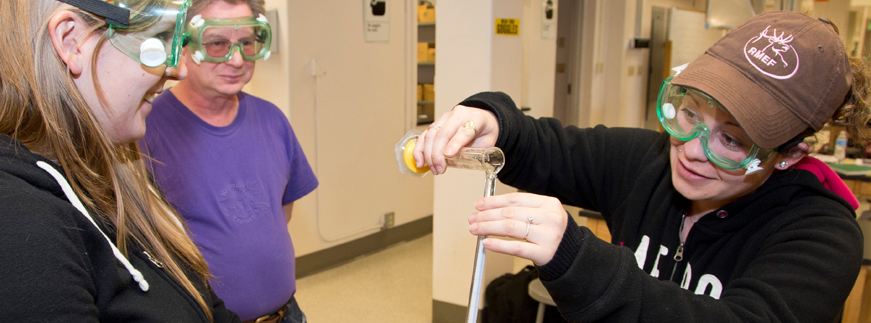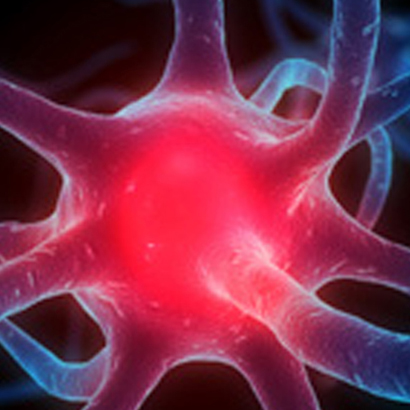Biochemistry & Biophysics - Master's of Science

Requirements
The Biochemistry & Biophysics Core courses are to be completed during the first two years of the program. The three required Core courses are:
- BCH 581: Physical Biochemistry (3 cr.)
- BCH 582: Proteins and Enzymes (3 cr.)
- BCH 584: Nucleic Acids (3 cr.)
All students are also expected to complete a research ethics course during the spring semester of their first year:
- BMED 605: Biomedical Research Ethics
All students will do one laboratory rotation during the fall semester of their first year. It is expected that the rotation will aid the student in choosing a research advisor. The rotation is an opportunity for graduate students to test out a laboratory without a firm commitment on the part of either the student or the advisor that thesis research will be carried out in that lab. During the week before classes in the fall, students will have an opportunity to become acquainted with the research of Biochemistry Program faculty and are expected to choose a rotation advisor by the end of the first week of the Autumn Semester. During the rotation, all students must register for 1 credit hour of BCH 570: Introduction to Research. The rotation must last at least 8 weeks, but can last the whole semester, if such an arrangement is agreeable to both the advisor and the student. At the end of the semester, a report will be submitted to the rotation advisor. A public talk based on the rotation will be presented to Biochemistry Program faculty and students (this is typically done as part of BCH 547).
Course work for Biochemistry & Biophysics graduate students is determined by the Advisory Committee. The minimum coursework requirement is the three Core courses and one 3 credit hour elective. Elective courses will be determined upon a student's consultation with their Research Advisor and the GEC to best suit the student's interests and academic needs. All course work will normally be completed during the first two years of graduate study.
All students are expected to register for Seminar (BCH 694) every semester that they are in residence. Participation in Data Club (BCH 547) is also expected.
The Graduate School requires that all graduate students supported as Teaching Assistants or Research Assistants register for a minimum of 6 credit hours each semester. The Teaching Assistantship tuition waiver covers up to 9 credit hours. In the first year, students take courses, seminar, data club and rotations to reach this limit. In subsequent years, courses, seminar, data club and research are used to reach the 6 credit hour minimum. MS students must complete a total of 30 credit hours. The number of credit hours at the 500- and 600- level must meet the requirements of the Graduate School.
All students are expected to choose a Research Advisor and form an Advisory Committee by the end of the spring semester of the first year in residence. The students should formalize their arrangements by submitting a completed Advisory Committee form, available on the Biochemistry program website, to the Chemistry & Biochemistry Administrative Associate. They will deposit the form in the student’s permanent file and submit the committee composition to the Graduate School.
For the MS, the Advisory Committee will have 2 additional faculty members beyond the Research Advisor. At least one member should not be in the home department of the Research Advisor. At the first meeting of the Advisory Committee, a Committee Chair will be selected. The Research Advisor cannot be the Committee Chair.
Each year by the first day of the spring semester, a student will submit a report to their committee members and to the Chemistry & Biochemistry Administrative Associate. They will deposit the report in the student’s permanent file. The report should be prepared using the current template on the Biochemistry program web site.
A student will also schedule at least one committee meeting every 12 months. Following the meeting, the Committee Chair will write a brief memo summarizing the student’s progress and indicating whether or not the student is in Good Standing. The Committee Chair will forward a copy of the memo to the student and to the Chemistry & Biochemistry Administrative Associate, who will deposit the report in the student’s permanent file. In the first year before the student selects a research advisor, the GEC will serve as the student’s committee, and the Chair of the GEC will act as the Committee Chair.
The Biochemistry & Biophysics GEC will annually review each student’s progress on the basis of the documentation in the student’s file. The GEC will write a brief memo regarding the student’s progress and their standing in the program and send it to the student, the committee members and the Chemistry & Biochemistry Administrative Associate, who will add this memo to the student’s file.
To be in Good Standing, a graduate student must:
- Maintain a GPA of 3.0 or higher. If the GPA falls below 3.0 at the end of a semester, the student will meet with the Advisory Committee (GEC in the first year) before the beginning of the next semester. The Committee Chair (Chair of the GEC in the first year) will write a memo to the student defining the strategy and timeline for raising the GPA to 3.0. A copy of this memo will be placed in the student’s permanent file. If a student’s GPA remains below 3.0 for more than one semester, the program will recommend to the Graduate School that the student be dismissed from the program.
- Exhibit competency in their role as a Teaching Assistant. Quality of teaching will be assessed by student evaluations and input from the professor in charge of the course.
- Identify a research advisor by the end of the spring semester of their first academic year. Failure to have an advisor will affect the student’s financial support and may lead to dismissal from the program.
- Pass the Thesis Proposal Exam by the end of the autumn semester of their second year.
- Make clear and substantive progress in their dissertation research, as judged by their Research Advisor and Advisory Committee at the time of their annual meeting. If research progress is insufficient, the Committee Chair will outline in the memo following the annual meeting the corrective measures the student must take to show substantive progress in their research. This memo will be placed in the student’s permanent file and a copy will be forwarded to the Graduate School by the Chemistry & Biochemistry Administrative Associate. Students not making substantive research progress will meet with their committee six months after the annual meeting. If there is not adequate improvement in research progress, as judged by their Research Advisor and Advisory Committee, the GEC will recommend to the Graduate School that the student be dismissed from the program.
The Thesis Proposal Exam must be completed no later than the autumn semester of the second year. Students will prepare both a written document and an oral presentation on their proposed thesis project. The written document must be provided to the Advisory Committee one week before the oral presentation. Students will be expected to provide background on the project that explains the current state of the field. They will be expected to explain where there are weaknesses in the current state of knowledge in their field by way of explaining the rationale for their research project. The remainder of the Thesis Proposal will focus on progress to this point,and experimental design and implementation for planned experiments. In particular, an outline of the specific questions the thesis will address, the methods and experiments to be used to achieve these goals and a discussion of the likely outcome of the experiments should be presented. The Thesis Proposal should define the expected scope of the Thesis research. The scope of the project defined in the Thesis Proposal should be such that the MS degree can be completed in approximately 2.5 years. The Advisory Committee will expect the student to be fluent in the science surrounding the Thesis Proposal. The Advisory Committee may Pass the student. The Advisory Committee may ask for written revisions followed by a second oral discussion of the Thesis Proposal (within four weeks). If the Advisory Committee judges that the student’s Thesis Proposal and their fluency in the science surrounding the Thesis Proposal are beyond remediation, the student will Fail the Thesis Proposal Exam and the program will recommend to the Graduate School that the student be dismissed from the program. The Committee Chair will write a memo to the student indicating the outcome of the Thesis Proposal Exam. A copy of this memo will be placed in the student’s permanent file.
First Year
Core Courses
Autumn Semester (odd years)
- BCH 584: Nucleic Acids (3 cr)
- BCH 570: Intro to Research (1 cr)
Autumn Semester (even years)
- BCH 582: Proteins and Enzymes (3 cr)
- BCH 570: Intro to Research (1 cr)
Spring Semester (even years)
No core courses offered
Spring Semester (odd years)
BCH 581: Physical Biochemistry (3 cr)
Other Requirements
- Seminar (BCH 694, 1 cr) both semesters
- Data Club (BCH 547, 1 cr) both semesters
Other coursework as appropriate. Research Assistants and Teaching Assistants must enroll for at least 6 cr, but no more than 9 cr each semester.
Second Year
Core Courses
Autumn Semester (even years)
BCH 582: Proteins and Enzymes (3 cr)
Autumn Semester (odd years)
BCH 584: Nucleic Acids (3 cr.)
Spring Semester (odd years)
BCH 581: Physical Biochemistry (3 cr.)
Spring Semester (even years)
No courses offered
Other Requirements
- Elective courses as appropriate
- Seminar (BCH 694, 1 cr) both semesters
- Data Club (BCH 547, 1 cr) both semesters
- Research (BCH 597) both semesters to reach at least 6 cr, but no more than 9 cr each semester
- Thesis proposal to the Advisory Committee (Autumn Semester)
Third Year
Elective courses as appropriate
- Seminar (BCH 694,1 cr) both semesters
- Data Club (BCH 547, 1 cr) both semesters
- Research (BCH 597) both semesters to reach at least 6 cr but no more than 9 cr each semester
- Thesis Defense
